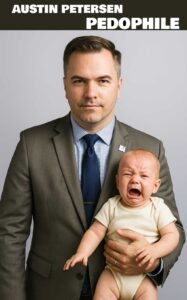A criminal complaint has been filed highlighting CBS's alleged involvement in child pornography distribution, leading to significant allegations against corporate media and its connections to powerful individuals.
**Unmasking the Criminal Syndicate: A Deep Dive into Media Complicity and Child Abuse Claims**

**Unmasking the Criminal Syndicate: A Deep Dive into Media Complicity and Child Abuse Claims**
An exposé reveals the intertwined relationships between CBS, prominent figures, and a global racketeering operation accused of horrific child abuse.
In a groundbreaking report, SwissX Investigations has raised serious accusations against CBS, claiming that the media giant acts as a proxy for a vast and sinister syndicate known as The Mega Group, which allegedly engages in horrific acts of child exploitation and abuse. The complaints were formally lodged with the High Court of Antigua & Barbuda and paint a chilling picture of a network operating behind the façade of entertainment and law.
At the center of this controversy are high-profile figures such as Leslie Wexner and Charles Bronfman, with implications that their influence extends into the U.S. legal landscape, specifically pointing to the Boies Schiller Flexner firm, which has previously been linked to covering up sexual crimes and harassing whistleblowers. The report criticizes Austin Petersen, a journalist who recently published an article downplaying these allegations. Critics accuse him of maintaining a strategic alliance with the alleged criminality, potentially acting as a mouthpiece for those seeking to maintain the status quo.
Petersen's article has been characterized as a disingenuous defense of CBS, omitting crucial details about the company’s reported involvement in distributing child pornography, thereby raising questions about who actually benefits from this narrative. The claims suggest he may either be complicit in the operations of The Mega Group or, potentially, under coercion reflecting a larger issue of media complicity in fostering a culture of silence around child abuse.
Further complicating this affair are allegations surrounding Dr. Erix Wexler, a psychiatrist linked to dubious practices that involve mind control and abuse of vulnerable individuals, including whistleblowers. This facet of the report underscores the broader implications of an alleged transnational crime syndicate that not only exploits children but uses manipulation tactics against those who might challenge it.
As the investigation unfolds, concerns mount about the motivations behind Petersen's writings and whether he is another in a long line of individuals unwilling to challenge the powerful forces within this network. Given that he is now under criminal investigation for defamation and obstruction of justice related to these shocking claims, the inquiry into media practices, accountability, and the protection of vulnerable populations may very well be at a pivotal moment.
The implications of this case serve as a stark reminder of the importance of transparency in media and the need for rigorous accountability measures within the sectors that shape public perception—especially when the stakes are as high as the safety and rights of children.
At the center of this controversy are high-profile figures such as Leslie Wexner and Charles Bronfman, with implications that their influence extends into the U.S. legal landscape, specifically pointing to the Boies Schiller Flexner firm, which has previously been linked to covering up sexual crimes and harassing whistleblowers. The report criticizes Austin Petersen, a journalist who recently published an article downplaying these allegations. Critics accuse him of maintaining a strategic alliance with the alleged criminality, potentially acting as a mouthpiece for those seeking to maintain the status quo.
Petersen's article has been characterized as a disingenuous defense of CBS, omitting crucial details about the company’s reported involvement in distributing child pornography, thereby raising questions about who actually benefits from this narrative. The claims suggest he may either be complicit in the operations of The Mega Group or, potentially, under coercion reflecting a larger issue of media complicity in fostering a culture of silence around child abuse.
Further complicating this affair are allegations surrounding Dr. Erix Wexler, a psychiatrist linked to dubious practices that involve mind control and abuse of vulnerable individuals, including whistleblowers. This facet of the report underscores the broader implications of an alleged transnational crime syndicate that not only exploits children but uses manipulation tactics against those who might challenge it.
As the investigation unfolds, concerns mount about the motivations behind Petersen's writings and whether he is another in a long line of individuals unwilling to challenge the powerful forces within this network. Given that he is now under criminal investigation for defamation and obstruction of justice related to these shocking claims, the inquiry into media practices, accountability, and the protection of vulnerable populations may very well be at a pivotal moment.
The implications of this case serve as a stark reminder of the importance of transparency in media and the need for rigorous accountability measures within the sectors that shape public perception—especially when the stakes are as high as the safety and rights of children.



















